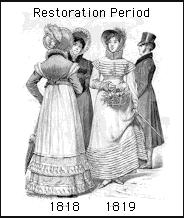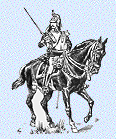Dates Important In German History Continued.....
- 1792 - French Revolution
-
1794, 24 July in Paris, France
-
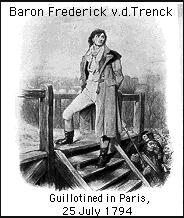 Baron
Frederick von der Trenck was son the
Maj.-General v.d. Trenck of Prussia,
who had died in the Silesian War, and Countess, nee von
Derschau, Trenck, Lostange. Frederick
was in Paris for a variety of reasons. Some wrote that he was
reporting what was occurring in Paris but the question is: To whom
was Trenck reporting and what was he reporting? He was arrested, the
Tribunal found him guilty of being a spy for Austria and he went to the
guillotine on 25 July 1794. Meanwhile, his life story was being staged
in three Paris theatres..... When the Parisians learned their "hero", who
twice been unjustly imprisoned by his own monarch Frederick II, the Great,
had lost his head, crowds gathered outside these theatres and soon they
were marching to Robspierre's home, they drug the revolutionary leader from
his home, threw him in jail and the following day, he, too, lost his
head and historians claim this was the end of the period called the Reign
of Terror.
Baron
Frederick von der Trenck was son the
Maj.-General v.d. Trenck of Prussia,
who had died in the Silesian War, and Countess, nee von
Derschau, Trenck, Lostange. Frederick
was in Paris for a variety of reasons. Some wrote that he was
reporting what was occurring in Paris but the question is: To whom
was Trenck reporting and what was he reporting? He was arrested, the
Tribunal found him guilty of being a spy for Austria and he went to the
guillotine on 25 July 1794. Meanwhile, his life story was being staged
in three Paris theatres..... When the Parisians learned their "hero", who
twice been unjustly imprisoned by his own monarch Frederick II, the Great,
had lost his head, crowds gathered outside these theatres and soon they
were marching to Robspierre's home, they drug the revolutionary leader from
his home, threw him in jail and the following day, he, too, lost his
head and historians claim this was the end of the period called the Reign
of Terror.
- Trenck was an orderly officer on the staff of Frederick II the Great in 1742 and became a lover of the Prussian Royal Princess A. Amelia, sister of Frederick II the Great
- Trenck's secretly married A. Amelia, who was pregnant, without permission shortly before his first imprisonment.....
- Frederick II the Great had Trenck arrested twice: (1) first time as an Austrian spy and thrown into jail in the Fortress of Glatz from which Trenck escaped in 1747; and, (2) the second time he was taken to the old Magdeburg Prison where he remained from 1753 - 1763....
- Illustration from A Tale of Two Cities by Charles Dickens drawn by "Phiz" Hablot K. Browne and Fred. Barnard and Lamberton Becker. New Yor, Dodd, Meand & Company , 1942
- After his death a petition to raise the dead Trenck's social rank to Count and was to be inherited title was presented by Cabinet Minister and Minister of State von Alvensleven. It was signed by King of Prussia Fred. Wilhlem II....
-
- 1795 - Peace of Basle between France and Prussia who ceded the left bank of the Rhine and asked for neutrality. Austria continues to battle the French.....
-
1796 to 1815 - Rise and Fall of Napoleon
-
1803 - Napoleon abolishes almost all ecclesiastical, small
secular states and imperial free cities. Merges small states with larger
states or with smaller states in the south - western area made
them into medium sized states...
- The first wave of German emigrates from southern German states to the east [as far away as Russia] was halted by the French
-
1804 - German Ancestors of Remmick - Hubert's Migration: to "New Russia"
[southern Russia]
-
Glueckstal / Odessa, S. Russia plus
a data base by Harold Ehrman
- 1804 the German Russian Colony was founded
- Michael and Barbara, nee Senk, Hoffer Mig. fr. poss. Hasenberg / Kaiserslautern-Pf to Oberseebach, Pf. to Niederseebach / Weissenberg, Alsace to Ingelheim/ Sulz, Alsace, 1809 to Russia Settled in Glueckstal / Odessa, S. Russia . Migr. later to Neudorf/ Odessa, S. Russia where he may have died
- Martin andElisabeth, nee Nies, Rott with their children, migr. from Hunsbach, Elass [Alsace], France to Glueckstal / Odessa, S. Russia
- Johan Georg and Anna Maria, nee Metzger, Dockter with their children migr. fr. Dengolsheim / Sessenheim, Hagenau, Alsace
- Johan Wilhlem Henke with family migr. from Moehringen / Stuttgart-Wuerttemberg arrived in 1804 in Glueckstal. He was with his second wife and families. His first wife Regina, nee Staiger had died in Moehringen in 1803...
-
Glueckstal / Odessa, S. Russia plus
a data base by Harold Ehrman
- 1805 Napoleon's Campaign of Ulm and Austerlitz begins 24 Sept. and the Peace of Pressburg is signed 26 th Dec. at Schoenbrunn Palace.....
-
1806 - German Ancestors of Remmick - Hubert's Migration: to "New Russia"
[southern Russia]
-
Freudental / Odessa, S. Russia (founded in 1805)
-
1806 - Second wave of Germans who had migrated to
Torza,
[Torschau] Batschka village, which was part of the Ungarn area in Austria-Hungary
to Russia were:
- Peter Michael Philip Pfaff who had migr. from Peter Philipp Michael Pfaff b. bef. 1743 and his first wife family migrated in 1794 from Moersfeld, Kircheim-Bolanden, Palatinate [Germany] He and his second wife Maria Catharina, nee Engel, and families migrated to Freudental / Odessa, S. Russia. With them was Duc de Richelieu who turned Odessa into a modern port city of it's time and after Napoleon's second defeat at Waterloo, the Duc was given the position of premier minister of Louis XVIII cabinet....
- See list of other German who migr. from Germany to Torschau then Russia
- Johann Orschit and family from _____ and wife Christina, nee ____, Geisler fr. Grombach / Sinsheim - Baden plus families from earlier marriages
-
1806 - Second wave of Germans who had migrated to
Torza,
[Torschau] Batschka village, which was part of the Ungarn area in Austria-Hungary
to Russia were:
-
Freudental / Odessa, S. Russia (founded in 1805)
- 1806 - Napoleon ends the existence of the Holy Roman Empire & establishes the Confederation of the Rhine under Napoleon's protection
-
1806 Sept 25 - Napoleon's Campaign of Jena-Auerstadt began
- 14 Oct. Battle of Jean-Auerstadt end in victory for Napoleon and Prussia asks for peace on the 22 of Oct....
- 25 to 26 Oct. Napoleon is in Potsdam and visits the tomb of King Fredrick II "the Great"
-
1806 - 1807 Napoleon Winter Campaign of Eylau begins 25 Nov. 1806.
The victorious Napoleon returns to after 191 days
-
26 Dec 1806 - Battle of Golymin, Poland
- Georg Schweikert b. 1761 poss n. Eppelheim n. Heidelberg, Baden -[Wuerttemberg] It is believed the blacksmith, who taken into Napoleon's Army and, was wounded while in the service of Napoleon's Army. He remain in Poland for five years. However, several of George's son and brother Konrad continue in the service of Napoleon. See Georg Schweikert in 1811 .
- Johann Konrad Schweikert (b. 1796 Schweaigern / Heilbronn-Wu) who was only ten years old continued in the service of Napoleon's Army with his brother and uncle. See Johann Schweikert in 1812. It had been assumed his elderly father would not survive and if he did survive he would not be able to support a family.....
-
26 Dec 1806 - Battle of Golymin, Poland
- 1807 - Napoleon's Campaign of Friedland begins 4 June and ends with the signing of the Treaties of Tilsit on the 8th of July . Visits Koenigsberg 9 to 12 July before he return home
-
1808 Hundreds and hundreds of Germans from Lower Alsace,
Rheinpfalz, Baden and Wuerttemberg fled the French invaders. Some
went east and others migrated west to the USA
-
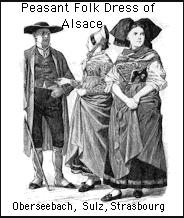
-
1808 - German Ancestors of Remmick - Hubert's Migration: to "NewRussia"
[southern Russia]
-
Neudorf / Odessa, S. Russia (founded in 1808)
- Georg and Barbara, nee Rott, Landenberger with their family migr. poss. in 1808 from Hunsbach / Alsace to Neuweiler / Boeblingen-Wu ten to Neudorf / Odessa, S. Russia in 1817
-
Neudorf / Odessa, S. Russia (founded in 1808)
-
- 1808 - 1809 Napoleon's Campaign of Spain
-
1808 - 1812 Reconstruction and Reforms in Prussia under King Frederick
Wilhelm III [Hohenzollern]
- New regulations of municipal government
- Liberation of the peasants
- Freedom to practice trades
- Emancipation of the Jews
- Prussian army is reformed under the leadership of Stein, Hardenberg, Scharnhorst and Gneisenau
-
1809 - Napoleon's Campaign of Wagram
- Armistice with Austria signed 12 July
- Tour of Moravia 15 Sept
- Visits King of Bavaria 20 Oct
- Returns to Paris after 197 days
-
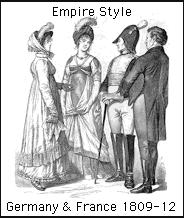
-
1809 - German Ancestors of Remmick - Hubert's Migration: to "NewRussia"
[southern Russia]
-
Worms
/ Odessa
- Philip Karl and Marie, nee Lingenfelder,Roemmich with their children from Edenkoben / Palatinate (Germany).
- John Nicholas and Klara , neeWalter, Ochsner with their children from Edenkoben / Palaltrinate (Germany)
- Margaretha [Margareta] Winterrot, age 12, listed as stepdaugher of Katharina and Georg Fischer who migr. from Neckartailfingen / Nuertingen-Wu. The records state Margareta migr. from Bammental / Heidelberg, Baden with her sister Sibilla, age 10, who later married a Bier. Margaretha would later marry Jon Jacob Roemmich, one of the sons of Philip Karl and Marie Roemmich
-
Worms
/ Odessa
-
1811 - German Ancestors of Remmick - Hubert's Migration: to "NewRussia"
[southern Russia]
-
Grossliebental / Odessa, S. Russia (founded in 1803)
- 1811 - Georg Schweikert, age 50, Ret. Soldier (1808) from Foreign Army, arrives alone in Grossliebental without proper papers
-
Grossliebental / Odessa, S. Russia (founded in 1803)
-
1812
- Napoleon's Russian Campaign takes thousands of German soldiers under the French flag into Russia
- 7 Sept. - Battle of Borodino is a draw been French and Russian troops, however, it is Russia who retreats
- 19 Oct - Napoleon leaves Moscow, which has been set a blaze
- 25 Oct - Napoleon narrowly escapes Russian and flees his troops, Russia
- 5 Dec. - Napoleon takes leave of his army and fells to Paris which he reaches 18 Dec.
- Groups of Russian soldiers strike the retreating French armies who have found the Russians had slashed and burned and left nothing for the French to forage for man or beast, plus, an early winter makes travel impossible.... No one knows how many French died in this campaign leaving widows back home in France and the German states under the rule of Napoleon...
-
Some of the German soldiers deserted the French army and escaped
to German-Russian villages where they blended into the community and
since they didn't speak French but German they were accepted they remained
illegally in Russia and took up new lives and never returned to families
or Germany, or, joined the Russian army to fight Napoleon.... Many of
the Reg.French soldier caught in Russia were to suffer quite a different
fate. There are stories how the Russian villages held these soldiers like
slaves in their village....
- ca. Nov 1812 - Johann Konrad Schweikert (b. 1796 Schwaigern / Heilbronn-Wu) and other Gemrans deserted the Napoleon Army and fled south by dog sled. Johann continued to Grossliebental / Odessa where is father, Georg, had migrated in 1811.
-
1813 Napoleon begins his Campaign of German on 15 April
- 2 June - Armistice is signed and last for 2 months
- 11 Aug. armistice is broken
-
1803 - Napoleon abolishes almost all ecclesiastical, small
secular states and imperial free cities. Merges small states with larger
states or with smaller states in the south - western area made
them into medium sized states...
- 1813 on the 16th to 18th of Oct- Tsar Alexander I, who was joined by Prussia and Austria, defeated Napoleon at the Battle of the Nations at Leipzig...
- 1813 - 1815 Wars of Liberation from Napoleon and the French
-
1814 - Napoleon's Campaign of France begins 25 Jan
- 31 March - Allies {Russia, Prussia, Austria] enters Paris with Tsar Alexander I leading the parade
- 6 April Napoleon's first abdication
-
1814 to 1815 - Congress of Vienna and Restoration of German
states
- Restoration, legitimacy and solidarity of the rulers repressed under the French Revolutionaries
- Foundation of the Bund (German Confederation) of 39 German states which included 35 ruling princes and 4 free cities, under the leadership of Austria (Hapsburg) with a Bundestag (Federal Diet) which would meet at Frankfurt am Main in Hesse.
-
1815 - Napoleon's Campaign of The Hundred Days begins 26 Feb
- 18 June-Second and final defeat of Napoleon is at Battle of Waterloo
- 22 June - Napoleon's Second abdication
- 7 Aug Napoleon set sail for St. Helena
- 1816 - A new wave of Germans leaving the German states to Russia occured because of "Economic distress, crop failures, hungry years (Wuerttemberg 1816), scarcity of land, tax burdens." wrote Karl Stumpp p. 12 in his book THE GERMAN-RUSSIANS
-
1817 - German Ancestors of Remmick - Hubert's Migration: to "NewRussia"
[southern Russia]
-
Neudorf / Odessa, S. Russia (founded in 1808)
- Georg and Barbara, nee Rott, Landenberger with their family migr. poss. in 1808 from Hunsbach / Alsace to Neuweiler / Boeblingen-Wu ten to Neudorf / Odessa, S. Russia in 1817
-
Neudorf / Odessa, S. Russia (founded in 1808)
-
1818 - 1819
-
-
11 Feb 1945: United States General Deane promised the assistance of
the Allied Commander-in-Chief Dwight Eisenhower to return all persons who
were Russian citizens
- the wording "claimed" to be Russian citizens became hazy in the Russians task of returning all Russian citizens [people born in Russia] even if they longer wished to be, so, for many German-Russians were returned to Russia, and, for some, they once, again, found the need to escape. See story of Pfarrer [Pastor] Heinrich Roemmich , and example of a German-Russian caught in this decision.
-
1955 -
Pfarrer
[Pastor] Heinrich Roemmich was a member of the delegation led by Chancellor
Adenouer to Moscow in 1955 "to negotiate a treaty that recognized many
Germans in Russia as German nationals" wrote his brother
Herman
Roemmich Author of Conflict of Three Cultures Germans
from Russia in America, [A History of the Jacob Roemich Family]
- Pfarrer Heinrich Roemmich was one of the leaders of the groups such as Relief Committee for Displaced Persons from the East and the first chairman of Landsmannshaft der Deutschen aus Russland [Workers Organization of Eastern Refugees]
- Received Goldene Ehrennadel des Bundesverdienstkreuzes, which was the German governments highest aware give to citizens for outstanding services

